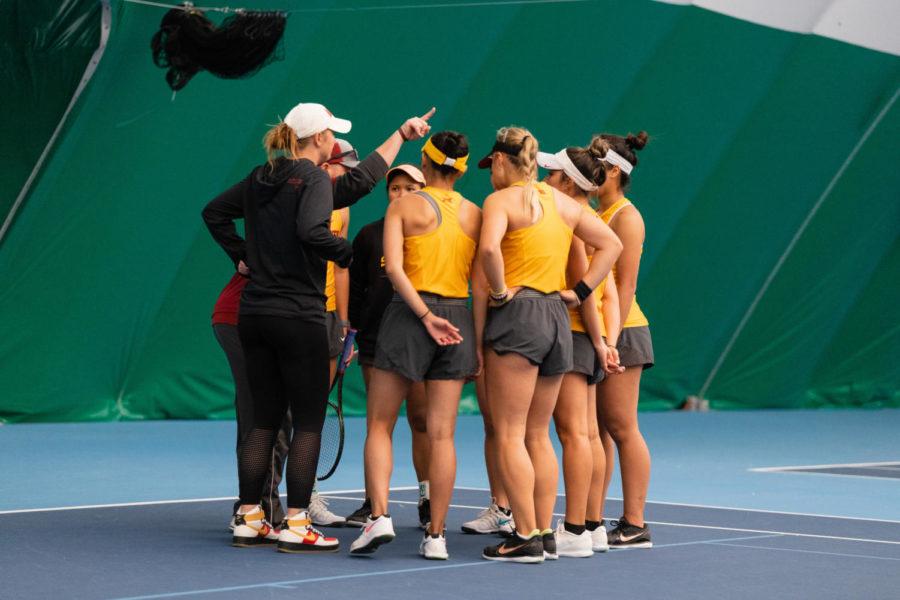Title IX: Tennis and the power of representation
Members of the Iowa State tennis team huddle together during the Cyclones’ match against the Oklahoma Sooners April 8.
July 3, 2022
For over half a century, women’s tennis at Iowa State was nothing more than recreational activity between classes. With the introduction of Title IX, the sport went from an after-school intramural to an opportunity for Iowa State women to play at the highest levels of competition.
Throughout its existence, the women’s tennis program has been consistently successful. Most recently, the team has been breaking program boundaries and developing talented young women.
While it took time for the university to fully buy into the capability of the women’s tennis program, the team proved its ability to compete against the best schools in the nation.
An important step
Before the introduction of Title IX, Iowa State tennis hardly resembled the program’s current state. Originally, tennis was divided into men’s and women’s teams. The men’s team competed as an intercollegiate team, whereas the women played other Iowa State women.
Rather than compete against other schools, women’s athletics featured inter-class contests. In tennis, winners in both singles and doubles were awarded medals or pins along with a regulation girl’s sweater.
The introduction of Title IX came at a critical point in women’s athletics for Iowa State, as intramural participation was booming. Under the leadership of Barbara Forker, head of physical education for women, Iowa State completed the construction of its $2.75 million women’s physical education building in 1973. The physical education department also experienced a merger of the men’s and women’s programs in 1974, expedited by Title IX.
“Title IX helped speed up the merger process a bit,” Forker said in Iowa State’s 1975 Bomb yearbook.
Although Title IX hurried the process along, Forker said the department was trending towards a merger regardless, as the entire philosophy of women’s physical education was beginning to change. During a time of change and progress within women’s athletics at Iowa State, the women’s tennis team began to compete as an intercollegiate team for the 1973 spring and fall seasons.
While still considered a tennis club, the Cyclones competed against other in-state universities. The spring team went 6-0 in the dual season and earned invites to the Luther and Millikin Invitationals.
With each passing season, Iowa State tennis consistently performed well against the competition. When the men’s tennis program was cut after the 1994 season due to budget reasons, the women’s team became the sole representation of Iowa State tennis.
Impact of Title IX
Without the introduction of Title IX, Iowa State women’s tennis may have been long delayed in evolving into an intercollegiate sport or subject to elimination during a round of budget cuts. Instead, the program is experiencing more success than ever before, with no indication of slowing down.
Title IX was initially the catalyst for women’s tennis to move from strictly recreational to a more competitive sport at Iowa State. The law also allocated more money for women’s sports, with funds being raised to $17,600 provided by the Women’s Intercollegiate Sports Association (WISA), a notable increase from the $3,000 provided by the Student Government.
Once it began to develop into a full-fledged collegiate sport, the women’s program grew alongside the men’s team. When a round of budget cuts following the 1994 season forced the university to decide which program to keep, the women’s program ultimately ended up surviving.
While the tennis program has greatly benefited from Title IX, it has not been immune to controversy regarding the law. In 2018, player Erin Freeman filed a Title IX complaint against the program. She cited racial and sexual discrimination and asserted that there was an effort to force her out of the program.
According to her official complaint, head coach Armando Espinosa and assistant coach Olga Elkin were described as providing a “hostile educational environment.” Furthermore, she said that Athletic Director Jamie Pollard and Senior Associate Director Calli Sanders implicitly sanctioned the discrimination.
Freeman also reported that Elkin often engaged with hostility towards herself and player Liera Bender, as they were the only two African American team members. On April 11, Freeman was informed that she was suspended from the team, as she was told her actions were negatively affecting her teammates. Ultimately, she was reinstated May 8, the same day that Espinosa and the rest of the staff were informed that their contracts were not being renewed.
Having the power to fight for their right to equal playing fields wouldn’t have been possible without Title IX.
Recent Success
Although Title IX kept Iowa State tennis around, it had never truly thrived to its full potential. With the resources and opportunities provided, the only thing holding the program back was a lack of competitiveness at a national level.
In the summer of 2018, Boomer Saia was hired as the new head coach for the tennis team. Since his arrival, the program has improved exponentially, and the Cyclones are currently performing better than ever.
Saia led the Cyclones to three winning seasons out of his four at Iowa State. He also oversaw three-straight winning seasons with two top-35 finishes in a row. Iowa State’s appearance in the NCAA tournament this past season was just the second in school history. The first was also under Saia in the 2020-21 season.
Along with the team’s success, Iowa State has also recently seen its most talented players rise through the program. Sophomore Thasaporn Naklo was the first Cyclone sent to the NCAA Singles Championships. Naklo was also the first Cyclone to win a match at the Singles Championships, beating Virginia’s Elaine Chervinsky before falling in the second round.
Freshman Ange Oby Kajuru and junior Chie Kezuka earned second-team All-Big 12 doubles honors in 2022 for the first time in school history. In Iowa State’s most recent years of competition, they have played at their best.
Title IX opened the door for women’s tennis at Iowa State, and the players have since taken advantage of the opportunity. With the right coaching staff paired with talented players taking command of the team, Iowa State is capable of reaching the highest levels of competition.

















